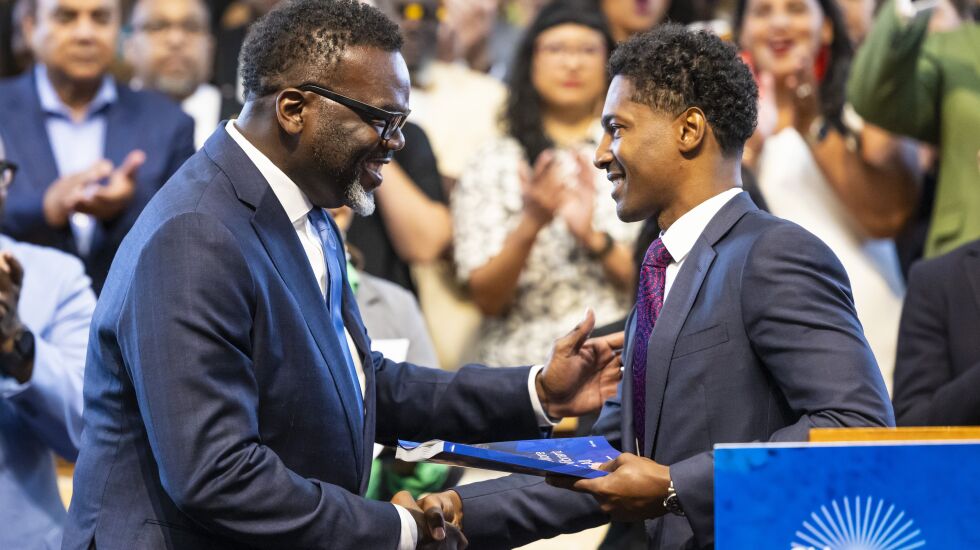
The report issued last week by Mayor Brandon Johnson’s transition team seeks to be an inspirational document that rallies the administration — and the city itself — around new and progressive governance.
And there are a lot of concepts in the 223-page report — titled “Building Bridges and Growing the Soul of Chicago: A Blueprint for Creating a more Just and Vibrant City for All” — that would be so brand-new around City Hall’s Fifth Floor, they would have to be ripped out of the plastic.
Things like the creation of a public bank to fund development in predominantly Black and Brown areas. And creating a guaranteed college fund for Chicago-born babies.
The city would shovel the snow from our sidewalks in the winter, and turn vacant buildings into service centers for crime victims.
But in all this newness, there’s one thing about the report that smacks of the same old, same old Chicago: The document doesn’t even suggest how the city will pay for any of the things the Johnson administration wants.
To be clear, at this juncture our complaint isn’t about the programs themselves.
But when Johnson released the report, he called it “a representation of how we will govern.”
If so, we’re troubled there isn’t a key chunk of the document dedicated to showing how the city could get its financial house in order.
The mayor and his team say they want to develop an equitable and better Chicago.
But how to pay for that, without overtaxing business or residents, is something that should not go unaddressed.
No consensus on a vital issue
It’s a critical question: How will the city and its mayor pay the freight for what it wants to do?
And it’s especially true for Johnson, who campaigned with a promise to raise $800 million in added revenue by taxing “the suburbs, airlines and ultra-rich.”
Candidate Johnson rightfully took fire for that statement. But if nothing else, it recognized — however ham-fistedly — that the city has a massive fiscal problem with which to deal.
Yet there are no solutions proposed in the transition report.
“We discussed specifics of the mayor’s tax policy and tax incentives for corporations, but did not reach consensus,” said the segment written by the Economic Vitality & Equity group, one of the 11 transition team committees that contributed recommendations to the report.
“Ultimately, we reached agreement that the mayor should work to grow the tax base and reduce reliance on property taxes,” the report states.
Yes, but every Chicago mayor since Anton Cermak has said the same. For the report to go mum on this point does a disservice to Chicagoans.
Without reforming the city’s finances and developing new, rock-solid funding mechanisms, the proposed new initiatives will have a tough, if not impossible, time becoming reality.
Beyond that, righting the city’s fiscal ship must be foundational for the Johnson administration, if bridges are to be built and — as the report says — souls are to be grown.
Because leaving it all to time, chance, and the political winds today ultimately makes the city cash-desperate tomorrow. And history shows the Fifth Floor’s judgment quickly turns questionable when City Hall fears its coffers are running low.
That’s led to blunders like the city selling off the Chicago Skyway in 2015, or entering into the infamous and disastrous parking meter deal in 2008. And time will tell, but the planned Chicago casino is sizing up to be possibly another epic misstep.
No chance for change without finance
In addition to the Economic Vitality & Equity committee, other teams contributing to the report were Arts & Culture; Education; Environmental Justice; Health & Human Services; Housing; Human Rights, Equity & Inclusion; Immigration; Public Safety; Transportation; and Workers’ Rights & Labor.
“I’m very optimistic about this city at this moment, when there are a lot of challenges and very disconcerting things happening in our country,” transition committee co-chair Barbara Ransby, a professor of Black Studies at the University of Illinois at Chicago, said when the report was released at an event last week.
“People have come together to really push for a progressive agenda, and to give and to animate Brandon Johnson’s campaign commitments around housing, around homelessness, around LGBTQ issues,” she said.
And these intentions are laudable and necessary to act on, if Chicago is to improve.
But there’s an old saying: “Romance without finance don’t stand a chance.”
And neither does good governance.
Send letters to letters@suntimes.com







